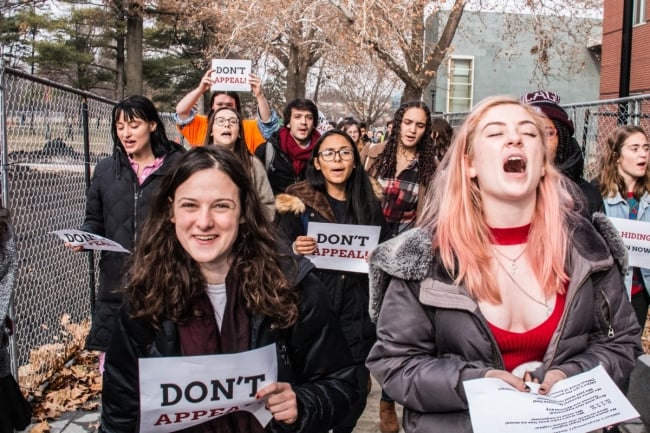You have /5 articles left.
Sign up for a free account or log in.

Paul Chan
Students at Grinnell College have decided to nix a campaign to expand their union of undergraduate workers, fearing that their petition to a Republican-controlled federal board would ultimately erode the rights of other similar units nationwide.
The once-good relationship that the union enjoyed with administrators of the small, progressive college in Iowa devolved into a bitter battle over whether it would grow to represent more than just Grinnell’s dining hall workers to every student worker on campus.
Grinnell administrators opposed the move. They said it would infringe on student privacy (the union leaders likely would have had access to private financial information about workers) and would complicate the relationship between students and professors and other staffers who advise or hire them. According to the Associated Press, President Raynard S. Kington said that 93 percent of the current senior class had worked for the college at some point.
Despite deep administrator opposition, student workers voted last month to approve the union expansion.
The college had hired two anti-union law firms, Nyemaster Goode and Proskauer Rose -- the latter of which has represented nearly every American professional sports league in negotiations -- to try to block the effort. And this month, the college appealed to the National Labor Relations Board in an attempt to nullify the election.
But union leaders were concerned that the NLRB -- the majority of which was appointed by President Donald Trump -- would rule against them, which seemed likely considering the political leanings of the board. A loss for the Union of Grinnell Student Dining Workers could then affect the status of other student unions and their ability to bargain. And so the students filed last week with a regional branch of NLRB to remove their petition, calling it a “flimsy possibility” that they would have a fair outcome with the Trump board.
“Historically, the labor movement has advanced not through court decisions and government institutions, but through the collective power of working people,” the union said in a statement Friday. “We continue to call on Grinnell College to negotiate with us over a framework to move forward and protect students’ rights.”
Neither a union representative nor Grinnell officials responded to request for comment.
But the college posted a statement saying it supported the move to withdraw the petition.
“The college’s concern has always been about how the expansion of the student union could affect Grinnell’s distinctive culture and diminish educational opportunities for our students,” the statement reads. “We believe the actions we took to preserve our educational mission were in the best interests of the Grinnell College community.”
In 2016, when the NLRB was in the hands of Democrats, it found that Columbia University’s graduate students could serve as employees and allowed them to unionize. Union supporters fear that the NLRB now is itching to revisit and reverse that decision, which could have come as a part of the Grinnell students’ push. William Gould, a Stanford Law School professor and former NLRB chairman under President Clinton, told The Guardian that the board members “will do so at the first opportunity.”
The rulings from the NLRB tend to vacillate depending on which political party is in power. Prior to the 2016 Columbia decision, the board had determined in 2004 that Brown University graduate students were not employees, which was a reversal from its verdict in 2000 in favor of teaching assistants at New York University.
Grinnell’s student union was launched in 2016 in an attempt to secure more money and additional rights for the dining hall employees. The leaders have since negotiated a pay increase from $8.50 to $9.76 an hour.




